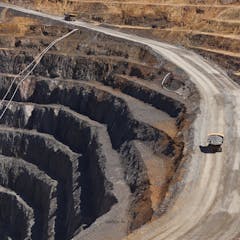
Articles on Resource extraction
Displaying all articles

The remote Bassari community, located between Senegal and Guinea, experiences climate change as one of many changes. They are best placed to come up with solutions that work for them.

Combining different approaches to time use presents an interdisciplinary picture of what the global human day looks like.

A gradual drawdown of gold mining is a critical step towards sustainability.

Our prospects of a better, fairer future are inextricably linked with the minerals and metals beneath our feet. Is it time to make peace with the industry that extracts them?

To fully understand what led to the stabbings in James Smith Cree Nation, we need to look at how the legacy of settler colonial violence impacts Indigenous communities.

In today’s episode, we hear from two women who talk about how diamond mines in the Northwest Territories have negatively impacted women and girls and perpetuated gender violence.

While marketing has made diamond rings a symbol of heteronormative happy endings, women from the Northwest Territories tell a different story about their experiences with the diamond mines.

New research finds Queensland’s laws fail to protect private conservation areas from the hidden impacts of mining on groundwater.

We think of mountains as remote and little affected by human activity. Unfortunately, the negative impacts of what we do has important implications for nature, wildlife and human society.

For 200 years, a small number of countries have exploited the marine wildlife of Antarctica, often with devastating impact on their populations.

Indigenous land stewardship, resource extraction and corporate interests remain critical issues to addressing large-scale environmental concerns such as pollinator loss in Canada and beyond.

Europe recycles 70% of its steel, but much is exported, turning what should be a circular process into a linear one. Instead, materials need to be circularity-ready the moment they’re manufactured.

The Bomvana say the global development agenda has created division because it sees people as individuals rather than primarily as members of a collective.

Fossil fuels are heating the atmosphere – but the fact that we’re burning them may not be the only reason.

The tailing dam collapse at the Brumadinho mine has shocked the world, but can we really be sure that ‘never again’ truly means never again?

The We'suwet'en First Nation is fighting the Coastal GasLink pipeline project, which would stretch nearly 700 kilometres across northern B.C. through their unceded land.

‘Social licence to operate’ is a term describing how much community support a project or company has. As the Northern Rivers CSG experience shows, failing to get it can have costly impacts for firms.

There are many debates northerners should have about the future Arctic, but the development of oil and gas is not one of them.

Until Acacia was served with $190 billion tax bill, it seemed as though Tanzania’s president wanted a new settlement with the mining companies. Now it looks as though he wants new mining companies.

South Africa’s mining industry is on an unsustainable trajectory and needs to undergo fundamental transformation that emphasises transparency, equity, and community participation.
